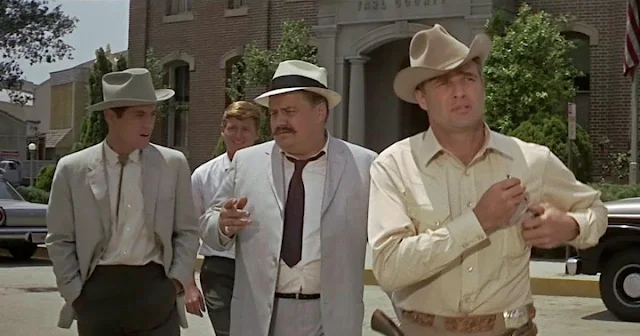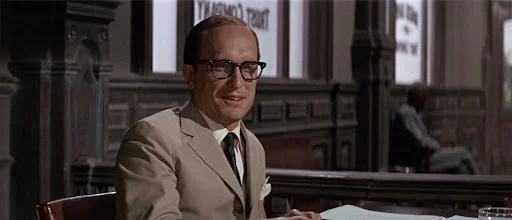Bad movies are often fun to watch anyway, and most of the people involved with The Chase, including director Arthur Penn, screenwriter Lillian Hellman, and star Marlon Brando, agreed that it was a bad movie. Brando let his opinion show, giving a sluggish performance that validates the old criticism that he mumbled his lines. Hellman had her script taken away and rewritten, and Penn struggled to deal with an ill-conceived project. The chief interest the film generates today is seeing actors like Jane Fonda, Robert Redford, and Robert Duvall on the brink of major stardom. There's a good deal of miscasting, including E.G. Mashall as the boss of a small town that seems to be in Texas or Louisiana. Marshall lacks the ruthless aura that the character needs. Angie Dickinson is wasted as the loving and dutiful wife of the town sheriff played by Brando. And Redford feels out of place in the role of Bubber Reeves, the town bad boy who escapes from prison (it's never quite clear what he did to be sent there) and stirs a manhunt, a lynch mob, and a conflagration in a junkyard. The town itself is a hotbed where everyone sleeps with everyone else's spouse and goes orgiastic on the Saturday night when the news of Bubber's escape breaks. It's a silly and lurid movie, but a little too long to be entertainingly bad.
A blog formerly known as Bookishness / By Charles Matthews
"Dazzled by so many and such marvelous inventions, the people of Macondo ... became indignant over the living images that the prosperous merchant Bruno Crespi projected in the theater with the lion-head ticket windows, for a character who had died and was buried in one film and for whose misfortune tears had been shed would reappear alive and transformed into an Arab in the next one. The audience, who had paid two cents apiece to share the difficulties of the actors, would not tolerate that outlandish fraud and they broke up the seats. The mayor, at the urging of Bruno Crespi, explained in a proclamation that the cinema was a machine of illusions that did not merit the emotional outbursts of the audience. With that discouraging explanation many ... decided not to return to the movies, considering that they already had too many troubles of their own to weep over the acted-out misfortunes of imaginary beings."--Gabriel García Márquez, One Hundred Years of Solitude
Search This Blog
Showing posts with label Jane Fonda. Show all posts
Showing posts with label Jane Fonda. Show all posts
Friday, July 26, 2024
The Chase (Arthur Penn, 1966)
Cast: Marlon Brando, Jane Fonda, Robert Redford, E.G. Marshall, Angie Dickinson, Janice Rule, Miriam Hopkins, Martha Hyer, Richard Bradford, Robert Duvall, James Fox, Diana Hyland, Henry Hull, Jocelyn Brando. Screenplay: Lillian Hellman, based on a novel by Horton Foote. Cinematography: Joseph LaShelle. Production design: Richard Day. Film editing: Gene Milford. Music: John Barry.
Tuesday, July 24, 2018
Spirits of the Dead (Roger Vadim, Louis Malle, Federico Fellini, 1968)
Metzengerstein
Contessa Frederique de Metzengerstein: Jane Fonda
Baron Wilhelm Berlifitzing: Peter Fonda
Contessa's Advisor: James Robertson Justice
Contessa's Friend: Françoise Prévost
Director: Roger Vadim
Screenplay: Roger Vadim, Pascal Cousin
Based on a story by Edgar Allan Poe
Cinematography: Claude Renoir
Production design: Jean André
Film editing: Hélène Plemiannikov
Music: Jean Prodromidès
William Wilson
William Wilson: Alain Delon
Giuseppina: Brigitte Bardot
Priest: Renzo Palmer
Director: Louis Malle
Screenplay: Louis Malle, Clement Biddle Wood
Based on a story by Edgar Allan Poe
Cinematography: Tonino Delli Colli
Production design: Ghislain Uhry
Film editing: Franco Arcalli, Suzanne Baron
Music: Diego Masson
Toby Dammit
Toby Dammit: Terence Stamp
Priest: Salvo Randone
TV Commentator: Annie Tonietti
The Devil: Marina Yaru
Director: Federico Fellini
Screenplay: Federico Fellini, Bernardino Zapponi
Based on a story by Edgar Allan Poe
Cinematography: Giuseppe Rotunno
Production design: Piero Tosi
Film editing: Ruggero Mastroianni
Music: Nino Rota
Of the three short films based on Edgar Allan Poe stories collected here under the title Spirits of the Dead, only the third, Federico Fellini's Toby Dammit, a freewheeling version of Poe's "Never Bet the Devil Your Head," really works. Roger Vadim's Metzengerstein is simply cheesy, with his then-wife Jane Fonda sashaying around in supposedly period costumes that are designed to reveal as much flesh as possible. The casting of her brother, Peter, as the man she loves, is obviously there to elicit a frisson of some sort, but it doesn't. Louis Malle's William Wilson stuffs a little too much of Poe's doppelgänger fable into its confines, and despite the presence of a cigar-puffing Brigitte Bardot, manages to pull whatever punches the story may have had, ending up rather dull. But Toby Dammit is a small gem, a concentration of Fellini's usual grotesques and decadents into a bright satire on celebrity: It's almost impossible to watch another awards show without recalling Fellini's acid-bathed take on it. Only the conclusion of the film really retains much of Poe, which suggests that Vadim and Malle might have been better off devising contemporary riffs on the material, as Fellini does.
 |
| Jane Fonda in Spirits of the Dead: Metzengerstein |
Baron Wilhelm Berlifitzing: Peter Fonda
Contessa's Advisor: James Robertson Justice
Contessa's Friend: Françoise Prévost
Director: Roger Vadim
Screenplay: Roger Vadim, Pascal Cousin
Based on a story by Edgar Allan Poe
Cinematography: Claude Renoir
Production design: Jean André
Film editing: Hélène Plemiannikov
Music: Jean Prodromidès
William Wilson
 |
| Alain Delon in Spirits of the Dead: William Wilson |
Giuseppina: Brigitte Bardot
Priest: Renzo Palmer
Director: Louis Malle
Screenplay: Louis Malle, Clement Biddle Wood
Based on a story by Edgar Allan Poe
Cinematography: Tonino Delli Colli
Production design: Ghislain Uhry
Film editing: Franco Arcalli, Suzanne Baron
Music: Diego Masson
Toby Dammit
 |
| Terence Stamp in Spirits of the Dead: Toby Dammit |
Priest: Salvo Randone
TV Commentator: Annie Tonietti
The Devil: Marina Yaru
Director: Federico Fellini
Screenplay: Federico Fellini, Bernardino Zapponi
Based on a story by Edgar Allan Poe
Cinematography: Giuseppe Rotunno
Production design: Piero Tosi
Film editing: Ruggero Mastroianni
Music: Nino Rota
Of the three short films based on Edgar Allan Poe stories collected here under the title Spirits of the Dead, only the third, Federico Fellini's Toby Dammit, a freewheeling version of Poe's "Never Bet the Devil Your Head," really works. Roger Vadim's Metzengerstein is simply cheesy, with his then-wife Jane Fonda sashaying around in supposedly period costumes that are designed to reveal as much flesh as possible. The casting of her brother, Peter, as the man she loves, is obviously there to elicit a frisson of some sort, but it doesn't. Louis Malle's William Wilson stuffs a little too much of Poe's doppelgänger fable into its confines, and despite the presence of a cigar-puffing Brigitte Bardot, manages to pull whatever punches the story may have had, ending up rather dull. But Toby Dammit is a small gem, a concentration of Fellini's usual grotesques and decadents into a bright satire on celebrity: It's almost impossible to watch another awards show without recalling Fellini's acid-bathed take on it. Only the conclusion of the film really retains much of Poe, which suggests that Vadim and Malle might have been better off devising contemporary riffs on the material, as Fellini does.
Thursday, April 5, 2018
Tout Va Bien (Jean-Luc Godard, Jean-Pierre Gorin, 1972)
Him, Jacques: Yves Montand
Her, Susan: Jane Fonda
Factory Manager: Vittorio Caprioli
Genevieve: Elizabeth Chauvin
Jacques: Castel Casti
Lucien: Éric Chartier
Georges: Louis Bugette
Léon: Yves Gabrielli
Frederic: Pierre Oudrey
Director: Jean-Luc Godard, Jean-Pierre Gorin
Screenplay: Jean-Luc Godard, Jean-Pierre Gorin
Cinematography: Armand Marco
Production design: Jacques Duguied
Film editing: Claudine Merlin, Kenout Peltier
Jean-Luc Godard and Jean-Pierre Gorin's sardonic look at what happened to the leftist intellectuals who were on the forefront of the May 1968 protests in France has two great cinematic showpieces. The first is the multi-chambered two-decker set on which we watch the employees of a sausage factory play out their messy, scattered, and mostly ineffectual efforts at a strike. Though the set is often described as an hommage to Jerry Lewis's similar set for The Ladies' Man (1961), the concept goes back to the era of silent comedy. The other remarkable sequence takes place in an enormous supermarket, in which the camera, placed behind the row of cashiers ringing up purchases, tracks back and forth as shoppers wheel up their goods, a communist hawks his book with a newly marked-down price, and a small revolution starts in which people are told that everything is free. It's a nightmare of consumer capitalism run amok. Godard and Gorin's satire is directed at the complacency into which everyone has sunk in the four years since May 1968, while attempting to demonstrate that the class struggle is still viable. It's conceived as a kind of film about a film, with off-camera voices discussing the need to cast stars -- i.e. Jane Fonda and Yves Montand -- to guarantee the money needed to make the movie. As a demonstration of Godardian film technique, it has moments of brilliance, but even though it scores some points, as political filmmaking it feels inert and now inescapably dated.
Her, Susan: Jane Fonda
Factory Manager: Vittorio Caprioli
Genevieve: Elizabeth Chauvin
Jacques: Castel Casti
Lucien: Éric Chartier
Georges: Louis Bugette
Léon: Yves Gabrielli
Frederic: Pierre Oudrey
Director: Jean-Luc Godard, Jean-Pierre Gorin
Screenplay: Jean-Luc Godard, Jean-Pierre Gorin
Cinematography: Armand Marco
Production design: Jacques Duguied
Film editing: Claudine Merlin, Kenout Peltier
Jean-Luc Godard and Jean-Pierre Gorin's sardonic look at what happened to the leftist intellectuals who were on the forefront of the May 1968 protests in France has two great cinematic showpieces. The first is the multi-chambered two-decker set on which we watch the employees of a sausage factory play out their messy, scattered, and mostly ineffectual efforts at a strike. Though the set is often described as an hommage to Jerry Lewis's similar set for The Ladies' Man (1961), the concept goes back to the era of silent comedy. The other remarkable sequence takes place in an enormous supermarket, in which the camera, placed behind the row of cashiers ringing up purchases, tracks back and forth as shoppers wheel up their goods, a communist hawks his book with a newly marked-down price, and a small revolution starts in which people are told that everything is free. It's a nightmare of consumer capitalism run amok. Godard and Gorin's satire is directed at the complacency into which everyone has sunk in the four years since May 1968, while attempting to demonstrate that the class struggle is still viable. It's conceived as a kind of film about a film, with off-camera voices discussing the need to cast stars -- i.e. Jane Fonda and Yves Montand -- to guarantee the money needed to make the movie. As a demonstration of Godardian film technique, it has moments of brilliance, but even though it scores some points, as political filmmaking it feels inert and now inescapably dated.
Tuesday, August 29, 2017
Youth (Paolo Sorrentino, 2015)
 |
| Michael Caine and Harvey Keitel in Youth |
Mick Boyle: Harvey Keitel
Lena Ballinger: Rachel Weisz
Jimmy Tree: Paul Dano
Brenda Morel: Jane Fonda
Queen's Emissary: Alex McQueen
Julian: Ed Stoppard
Paloma Faith: Herself
Miss Universe: Madalina Diana Ghenea
Masseuse: Luna Zimic Mijovic
Sumi Jo: Herself
Director: Paolo Sorrentino
Screenplay: Paolo Sorrentino
Cinematography: Luca Bigazzi
Music: David Lang
 |
| Woody Allen |
Cinemax
Subscribe to:
Comments (Atom)









